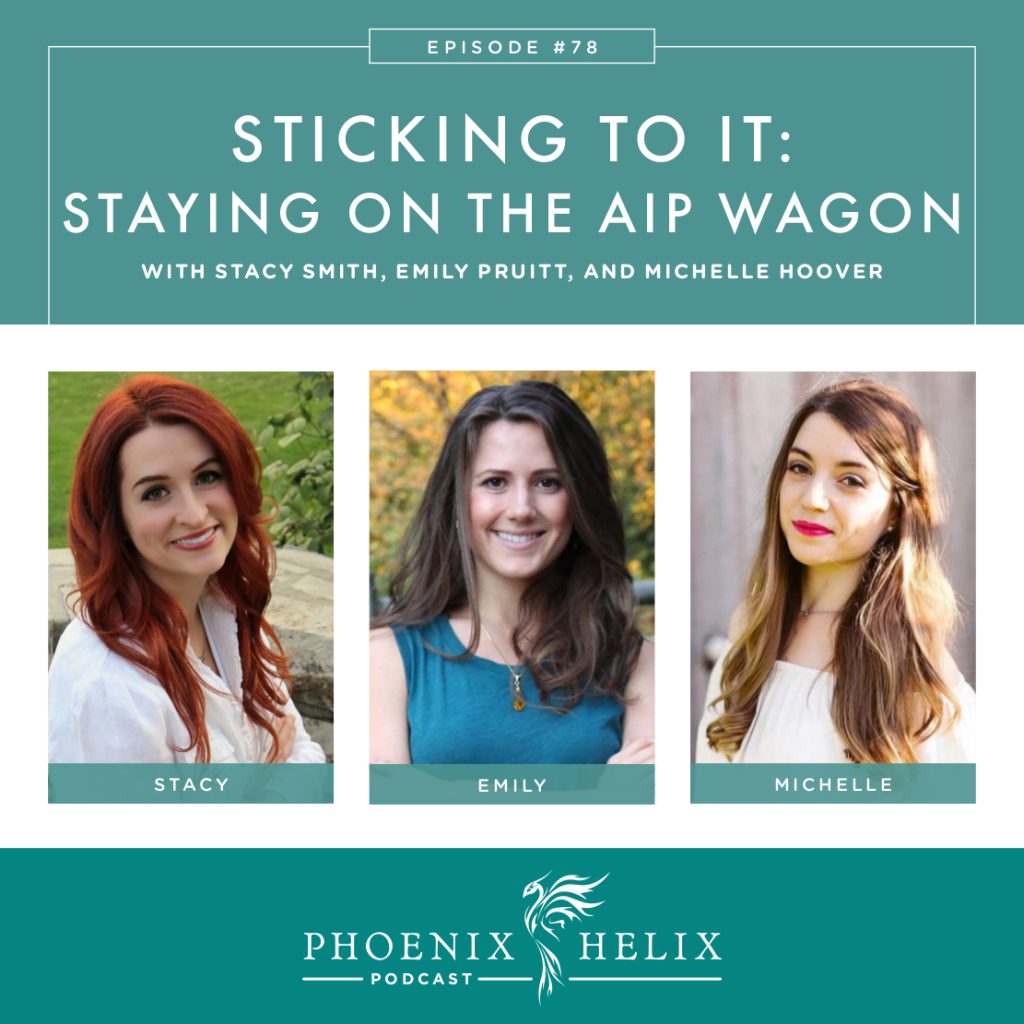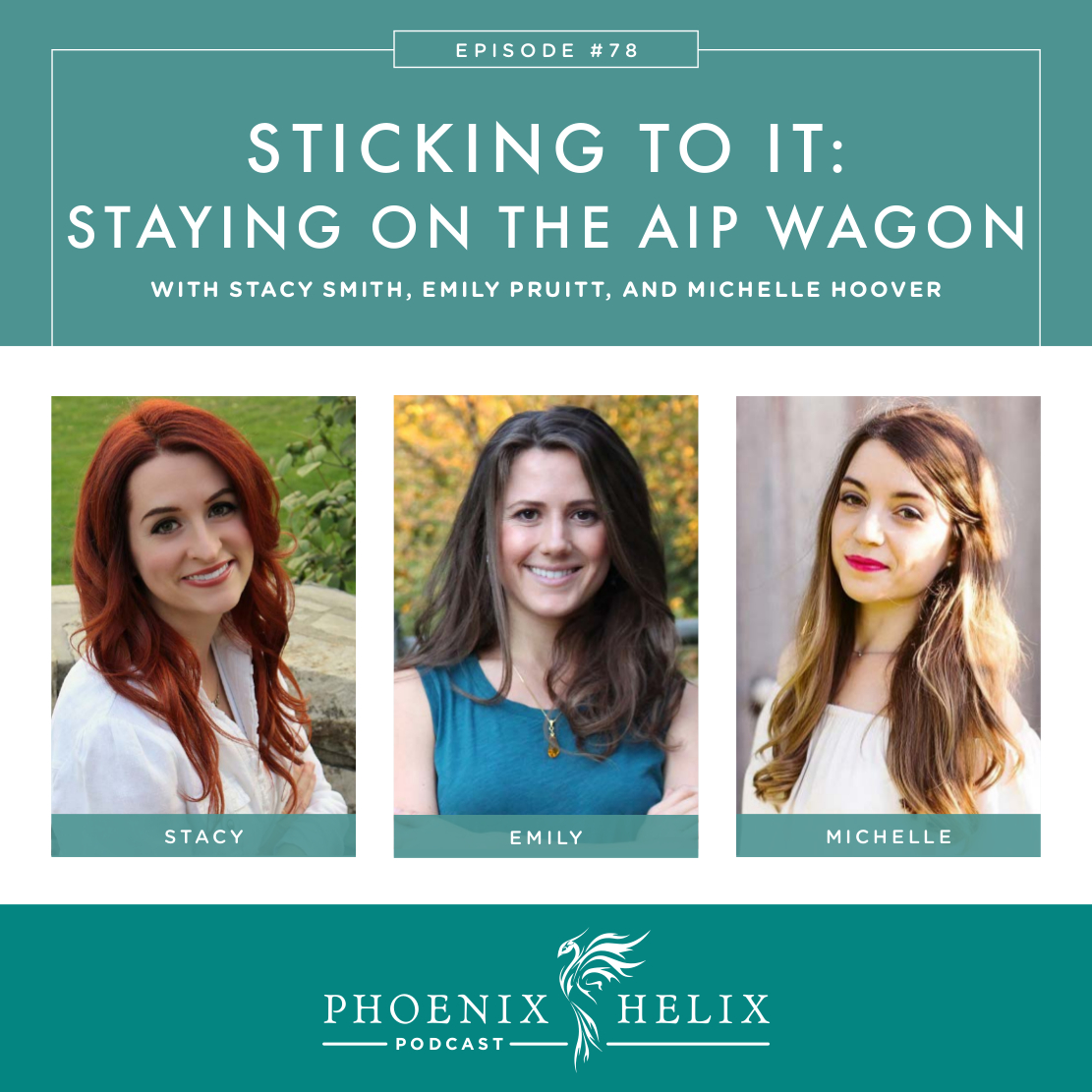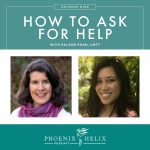
Making the Paleo Autoimmune Protocol Work for You
Let’s be honest. The AIP is hard to do, and some people have a harder time than others. Today, I’ve invited 3 health & nutrition coaches onto the show, to share techniques that help their clients maintain a healthy lifestyle against all temptations and obstacles. All three of these ladies have personal experience following the autoimmune protocol for their own health as well. Let’s help each other succeed!
Listen to the Show
- Subscribe to my podcast through your favorite podcast app: iTunes, Stitcher, Google, TuneIn, Spotify, Amazon, etc.
- You can also listen to the episode right here through the player below, and if you subscribe to my newsletter you’ll get notified of future episodes.
Podcast: Play in new window | Download
Show Notes
- Intro (0:00)
- Thank You to Our Podcast Sponsor – Paleo on the Go (2:09)
- A frozen meal delivery service, they have a large menu of items for the paleo autoimmune protocol (AIP).
- Use the code PHOENIX for 10% off your first order.
- Meet Our Guests (3:28)
- Michelle Hoover has Hashimoto’s disease. She is a nutritional therapy practitioner and the voice behind the blog and podcast Unbound Wellness. Her rock bottom was during college, when her fatigue was so high she slept up to 18 hours a day and only woke up to go to class. She also experienced severe digestive problems; everything she ate caused bloating and pain. Now, her life is dramatically different. She has the energy to work full-time, exercise, and enjoy her life. She’s also been able to heal her digestion so that she can enjoy food again. The diet & lifestyle pieces that made the biggest difference for her were the AIP, troubleshooting gut health, and learning to love her autoimmune journey rather than feeling victimized by it.
- Stacy Smith has lupus and antiphospholipid syndrome. She is a nutritional therapy consultant and the voice behind Viridis Wellness (website coming soon). At her worst, she was bedridden with extreme pain, fatigue, and depression. A year of autoimmune medication trials left her feeling worse instead of better. She finalized realized she was the only one who could help herself, and research led her to the AIP. Progress was slow, but after a few months, she regained her ability to walk without pain, and empowerment replaced her feelings of despair.
- Emily Pruitt is a health and wellness mentor and the voice behind the blog SoleFire Wellness. She had a wide variety of symptoms throughout her childhood and early adulthood, but in spite of seeing numerous doctors, never received a diagnosis. As a child, doctors told her she was “just sensitive.” Her rock bottom happened at age 19 when her symptoms hit a crisis point. She suffered rapid weight loss, experienced severe pain, lost her ability to walk, developed cystic acne and eczema, stopped menstruating, and was unable to tolerate any foods. She ended up in the hospital on food formula and an IV drip. When doctors were unable to provide any explanations, she started researching alternatives, and through self-experimentation ended up on a diet very similar to the AIP. This was 12 years ago, before the online paleo community existed. Slowly, her symptoms diminished, and her health improved. Now, she feels great. She has lots of energy and teaches dance and holistic fitness. Her weight is stable, her skin has cleared, her hormones have balanced, and her food tolerance has improved dramatically. In addition to the AIP, sleep, stress management, supportive relationships, and self-compassion made the biggest difference in her healing.
- Obstacle 1: Lack of Preparation (20:30)
- Coaching advice from Michelle.
- “If you fail to plan, you are planning to fail.” ~ Benjamin Franklin
- Do your research. Understand the why’s and how’s behind the protocol. (Resources: A Simple Guide to the AIP and The Paleo Approach.)
- Baby steps often make the transition easier.
- Prepare your body by learning how to stabilize your blood sugar and support your digestion. (Resource: 8 Ways to Improve Your Digestion.)
- Prepare your home. Remove the foods you can no longer eat and stock the foods you can. (Resources: AIP Grocery List and AIP Kitchen Tour Video).
- Talk with other members of your household on how you can safely share a kitchen if they aren’t following the AIP themselves. (Resource podcast: Eating AIP in a Non-Paleo Home.)
- Obstacle 2: Lack of Health (30:24)
- Coaching advice from Stacy.
- How to begin when your autoimmune symptoms are disabling.
- Spend sometime thinking about your motivation and reason for embarking on the AIP. What is your health goal? Write that down and put it someplace you will see it every day: on your fridge, on your bathroom mirror, a note on your smartphone, etc. If you meditate, incorporate that into your meditation practice.
- Start a gratitude journal, to help shift your mindset from victimhood to empowerment.
- List the following resources in order from those of which you have the most, to the least: Time, Money, Support, and Energy. Tap the resources you have first, and then see where you can ask for help in other areas.
- Obstacle 3: Lack of Support (35:05)
- Coaching advice from Emily.
- When we embark on the AIP, it also affects the people around us. How do we navigate our relationships and find the support we need?
- Start with compassion, understanding that this is a scary time for those you love as well. It’s hard for them to see you suffer, and the big change you are embarking on can be intimidating and sometimes even threatening to those around you.
- Educate people on why you’re doing it. A Simple Guide to the Paleo Autoimmune Protocol is a great book to give as a gift. For audio learners, let them know about this podcast (Episodes 1-3 especially). For visual learners, here’s an overview of the AIP on Youtube.
- Lead by example. Often once people see the positive impact this diet and lifestyle has on your health, their support increases exponentially.
- For spouses, ask them, “What can I do to make this easier on you?” That might prompt them to ask the same question of you, and you can make some agreements that support both of you. If you’re working with a health coach, you can do a couples coaching session to answer questions and help you plan and negotiate an AIP-friendly household. And marriage counseling is a good choice for large issues beyond simple troubleshooting.
- If people still refuse to be supportive, distance yourself from them in food situations, wherever possible. Remember that you don’t need other people to validate your choice or your experience. And be sure to find support elsewhere.
- Resources:
- Article – How Do I Get Support From Family and Friends?
- Podcast – Eating AIP in a Non-Paleo Home.
- Obstacle 4: Lack of Time (46:37)
- Coaching advice from Michelle.
- Everyone’s busy, whether you’re a student, a parent, a caregiver, working full-time, or all of these combined. Autoimmune healing can feel like a full-time job in itself. How do we prioritize and make the most efficient use of the time we have?
- Become efficient in the kitchen with meal planning, batch cooking, and meal simplification. (Resources: Eileen’s Meal Planning Tips, Michelle’s Meal Planning Tips, Saving Time in the Kitchen Podcast, and 30 Minute Meals for the Paleo AIP.
- Use timers to track how much time you are spending on different activities during your day. It can be eye-opening for things like social media. Then, you can decide where you want to shift your time priorities. Timers can also help you focus and complete tasks more quickly.
- The power of saying no. The truth is we can’t do everything, which means we need to say no to certain things. (Resource: Boundaries and the Art of Saying No.)
- Resource: Time Management Podcast.
- Obstacle 5: Lack of Money (56:27)
- Coaching advice from Stacy.
- How to do the AIP on a budget.
- Step 1: Set a budget. Figure out where you are currently spending your money and where you can reallocate more money for real food. (Resources: Budgeting for Beginners and Goodbudget App.
- Step 2: Comparison shop. Research your local grocery stores to find out which ones offer the best prices on which foods. You may need to shop a variety of stores for the best deals.
- Step 3: Prioritize where to spend your organic produce dollars with the help of EWG’s Clean 15 and Dirty Dozen. For meat, prioritize organic on bones and organ meats.
- Step 4: Establish relationships with your local farmers. Farmers often have cuts of meat that aren’t popular and therefore less expensive. Also, offer to barter your time for food. Most farms need help. (Resource: Local Harvest.)
- Step 5: Gardening is the freshest, most nutrient-dense produce at the lowest price. (Resource: Grow a Garden Anywhere).
- Step 6: If you have freezer space, buy your meat in bulk for a greater discount, and shop frozen vegetables when they are on sale.
- Resource article: 12 Tips for Eating Paleo AIP on a Budget.
- Obstacle 6: Perfectionism (1:03:50)
- Coaching advice from Emily.
- The stress of perfectionism can cause autoimmune flares, just as much as poor food choices.
- The root of perfectionism is usually fear and control. Food is meant to be pleasurable as well as nutritious. Fear isn’t a nourishing mindset, so exploring those emotions from a mindbody perspective can help. (Resource: The Psychology of Eating Podcast).
- While the elimination phase of the AIP requires 100% compliance, sometimes people raise the bar so high that it becomes unsustainable. (Resource: Beware of AIP Perfectionism Video.)
- After the elimination phase, reintroductions are the next step. Sometimes fear or control prevent people from taking this step. (Resource: The Paleo AIP Reintroduction Guide.)
- There are a lot of foods allowed on the elimination phase, so eat as wide a variety as possible. Deep nutrition, rather than too many food restrictions, is what our bodies need to heal. (Resource: Are You Eating Enough Food to Heal Your Body?)
- Resources:
- Podcast – Perfectionism.
- Article – Lean Into Uncertainty
- Book – The Gifts of Imperfection.
- Redefining Success Vs. Failure (1:13:00)
- Michelle: Though there may be bad days, there is no such thing as absolute failure. One misstep doesn’t erase all you achieved prior, and the misstep itself contains important lessons that can motivate you to make better choices going forward. We are imperfect people in an imperfect world, and we’re all just learning how to be better every day.
- Stacy: Admit that you screwed up, but know that doesn’t make you a bad person or a failure in life. Own your mistakes, learn from them, forgive yourself, and then move on. People shouldn’t fear failure. We all fall down sometimes. The only way we can truly fail is if we don’t get back up again.
- Emily: Since we are human, this does happen. Don’t be surprised. Respond to yourself with gentleness and compassion, rather than judgment. Then ask yourself two questions: (1) Why are you following the AIP in the first place? Then, find something that supports that “why”. (2) Why did you slip up? Then, figure out how you can avoid this situation in the future. Get health coaching help if needed.
- Resource: The Other F Word Podcast.
- Outro (1:20:45)
- Michelle Hoover is a nutritional therapy practitioner and the voice behind the blog, Unbound Wellness. She’s also the author of the ebook, The 30 Day Autoimmune Makeover.
- Stacy Smith is a nutritional therapy consultant and the voice behind Viridis Wellness. And she facilitates a Facebook Group called The Autoimmune Athlete.
- Emily Pruitt is a health and wellness mentor and the voice behind SoleFire Wellness. She offers wellness mentoring, cooking workshops, and holistic fitness classes.
- Eileen (your podcast host) is the author of multiple books, written to help people thrive with autoimmune disease. Learn more on the Books Page.
- If you like this podcast, follow or subscribe through your favorite podcast app. You can also subscribe to Eileen’s biweekly newsletter.
- Check out the entire archive of podcast episodes.
Spreading the Word
If you like the podcast, please leave a positive review in iTunes. It would mean the world to me, and also helps others find the podcast. Here are some quick instructions using your iPhone:
- If you are already subscribed to my podcast: (1) Click the purple podcast icon. (2) At the bottom of the screen, click Library. (3) At the top of the screen, click Shows. (4) Click the Phoenix Helix podcast image. (5) Scroll down the page, and you’ll see Ratings and Reviews. Scroll down a little bit more and click on Write a Review. This will bring up the review screen. Tap 5 stars (if you love the podcast), and then click in the title box, and it will bring up the keyboard. Enter a title and short review. (6) Click Send in the upper right corner. (7) Thank you! Positive reviews give the podcast a higher search ranking in iTunes, helping people find it and letting them know it’s a quality podcast and worth their time to listen.
- If you haven’t subscribed to my podcast: (1) Click the purple podcast icon. (2) In the lower right corner, click the magnifying class. (3) Type Phoenix Helix in the search box. (4) Click the podcast cover in the Show list. (5) If you’d like to subscribe, click the + sign at the top of the screen. (6) To write a review, scroll down the page, and you’ll see Ratings and Reviews. Scroll down a little bit more and click on Write a Review. This will bring up the review screen. Tap 5 stars (if you love the podcast), and then click in the title box, and it will bring up the keyboard. Enter a title and short review. (7) Click Send in the upper right corner. (8) Thank you! Positive reviews give the podcast a higher search ranking in iTunes, helping people find it and letting them know it’s a quality podcast and worth their time to listen.









Eileen –
Hi all – I apologize if this is the wrong place to post this but I can’t find anywhere online to get help. Here goes ….
I became ill suddenly 2.5 years ago and remained as such with no known cause and was recently diagnosed with Chronic Fatigue Syndrome. We are trying to figure out the cause still but in the meantime I have done what I can to support my body.
I have been on AIP for 6 weeks now with 100% compliance. I haven’t seen a change in my symptoms (which I am not concerned about at this time). However – my hormones are going out of control. I have started getting massive amounts of horrible cystic acne around my jaw, chin, mouth. And I am having hot flashes and chills like crazy. My sleep has gotten worse as well.
There has been no change in anything else except AIP. Any insights to why this might be happening if related to AIP?
I don’t have the energy or money to see yet another doctor to figure this out right now so I figured I would try here to get some help.
Thanks so much!
Rachel
Hi Rachel. I’m so sorry you’re having this experience. My gut feeling is that it’s independent of AIP. Often we confuse correlation with cause, which is easy to do. If you want to test it out, stop AIP for a week and see if your symptoms improve. The reason I doubt AIP is the cause is that it removes many of the foods that affect hormone balance (like dairy, soy, and flax). For most people, hormone balance improves. If you were eating a lot of those foods before, I suppose it’s possible you might be experiencing a re-balancing as your body adjusts to going off those food-induced hormones. For other troubleshooting ideas, please listen to my podcast on Hormone Balance and Autoimmune Disease: http://www.phoenixhelix.com/2016/02/13/episode-38-hormones-and-autoimmune-disease-with-dr-justin-marchegiani/. Wishing you wellness in every way.
Thanks so much for your response! I will listen! Very grateful 🙂
Eileen,
I am a devoted listener to the Pheonix Helix podcast, and I am so appreciative of your dedication to spreading good information and support for those living with autoimmune disease. I was listening to the most recent episode, “Staying on the Wagon”, and was thoroughly enjoying the perspectives from the guests, and feeling very supported and heartened by them. So it was an incredible punch to the gut to hear one of your guests encouraging folks to save money at the farmers’ market by waiting until the end of the market for produce giveaways. I know she meant no harm by this suggestion, but it has become a very widespread “life-hack” lately. But as an organic veggie farmer myself, I have made a commitment to correct this misconception whenever and wherever I see it which is why I am writing you now.
As we all know, real, fresh produce is undervalued in society. It is more expensive than non-real food due to many systemic issues we should all work to correct. But in the meantime, farmers like myself are in a constant battle to earn their living from the earth and bring people the best food possible. As both a farmer and someone suffering with an autoimmune disorder, I am particularly dedicated to nourishing my community. Every item unsold at the end of a market day isn’t simply a pain to bring home – it represents less money to pay the mortgage, or fix the tractor, or take a child to the doctor. Our margins are so slim to begin with, and our prices are already set at the minimum we can bear, so it is heartbreaking to hear folks say at market “Oh I was waiting to buy this from you to put it on sale”. I have seen blogs written by fellow farmers to attempt to correct this, but it stubbornly persists. The fact is, small growers go bankrupt every day. And every farmer I know is certainly empathetic about financial struggles; Lord knows we have them!! But, saving money at the farmers’ market in this manner is a band-aid to a much larger problem, and if we can’t make a living, there simply won’t be farmers growing the food we need to be healthy – discounts or not. I hope that you wouldn’t mind sharing this perspective with your readers/listeners, or certainly with the guest. Her suggestion for someone with a financial hardship to trade produce for work/a service was a great one, by the way!
Thank you again for your advocacy! Be well,
Kendyl
Kendyl, thank you so much for sharing your perspective. I will pass this along to Stacy, and I will be sharing it on my Facebook page as well.
Hi Kendyl,
Thank you for sharing your perspective. I think you’ll find that I have an open mind, and generally take feedback of all varieties quite well. When I get what might appear to be a negative response to something I’ve communicated with the public, I always take a moment to mull it over and evaluate it. In this case, I think I am more a partner in advocacy than perhaps you yet know. I’ve invested a lot of time in developing relationships with my local farmers, and go to great lengths to understand and support them. It’s my practice to take each of my clients to meet my local farmers in person, free of charge, teach them why buying from local farmers matters (for our own health, the health of the animals, the health of the planet, and the ability of these small businesses to survive), and to help them establish an intimate connection with these folks and their families. I want every client to hear each local producer speak to why they do what they do. That’s where the passion is, and it’s contagious. Fostering that connection is how I help to grow the local food movement, one person at a time. I get great joy from working alongside these farmers on their land when they have something going on which requires some extra help. My farm visits are always working visits. It’s taken me a long time to earn the trust of the local organic community who produces incredible food, and I feel honored every time they come to me for help with something. As a former vegan, where my food comes from matters a great deal to me. Knowing who produces my food, and how, by way of seeing it myself, is the only way I was able to make the transition to AIP. Having such strong beliefs about animal welfare, I had to dig deep into my local farm culture to make peace with how I eat now in support of my health. I’ve approached it as an education, and am grateful for everything my local farmers have taught me. They’re an endless source of knowledge and perspective for someone who grew up in an industrial area of NY. What you shared with Eileen fits the general theme of what I’ve learned about how challenging it is to survive as a small organic grower. Margins in produce are especially thin, and people often seem to have an excuse to buy what they think is an equivalent product (but isn’t) for less at the store. I can see why what I said may have offended you. In truth, my intent was not to portray that anyone who is able to purchase quality produce from quality growers should wait until market end to try to get it for free. My intent was to say that if food is your medicine, and you legitimately can’t afford your medication, and you have an actual relationship with the people who grow your food, I have frequently seen them offer it at market end to those who are enduring hardship rather than take it home. If my message was different than this, then I chose my words poorly and I apologize. Even so, I honestly wasn’t aware that this was a hot button topic among small farmers and appreciate your taking the time to educate me further. It was not my intent to encourage Eileen’s listeners to employ any kind of strategy that takes advantage of local producers, whom I respect and appreciate. Your feedback has been warmly received and you are welcome to reach out to me privately to continue the conversation. Greater understanding grows from sharing perspectives on both sides of any issue.
Thank you again for taking time to articulate your message. I actually consider this to be one more reason I loved being on Eileen’s show. Without it, I may never have gained this new nugget of information, and knowing how to best support small growers has a special place in my heart. We need you guys, and you need us. It can be a win-win, if we all work together towards the same goals.
Warm regards,
Stacy Smith, NTC
Viridis Wellness
Stacy, thank you so much for your thoughtful reply. I love this community and the way we support each other on our journey to wellness, having open conversations that expand our perspective along the way.